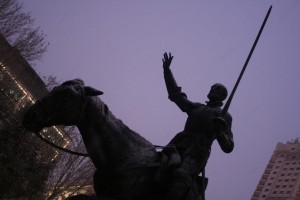A Medio between Incompetence and Perfection
It was January of 2000 and the world had survived the millennium bug. The place was Breckenridge, Colorado and a member of my wife’s family had a cabin near the ski resorts. There at the top of the mountain I got my first bit of instruction in the ancient art of skiing.
The first and last thing I heard was, “Lean forward,” and so I did. I began to slide down the mountain gaining speed. I had no way to steer and no idea what I should be doing. I found myself completely out of control and was headed towards the trees at increasing velocity. Before I painfully crashed I orchestrated a controlled wipe-out into the snow with poles, skis, and limbs all flying in different directions. The remainder of the day was a repeat of the same series of leanings forward with various wipe-outs. I got better instruction and learned how to stop by “snow-plowing”. By the end of the day I had learned how to turn and stop with the skis parallel.
Sometime ago I became interested in the study of incompetence and how incompetent people generally behave. Specifically I was interested in the meta-cognition of incompetence as studied by Justin Kruger and David Dunning who found that incompetent people were unable effectively to evaluate their own competence. This lack of ability to understand personal competence has been called the Dunning–Kruger effect and restated basically it means that incompetent people tend to overestimate their own level of skill.
Link to the study:
https://www.math.ucdavis.edu/~suh/metacognition.pdf
(For an academic study, this is riveting material to read especially as a researcher, teacher, or student of martial arts.)
Compare that to Carranza’s statement, “He who knows most doubts most.” Carranza adds the perfect corollary to the DK effect and uniting the two ideas has given me a basis for moving forward during difficult tasks. (As an example, when a prairie-born Okie is rolling down a mountain with skis tied to his feet.)
The point isn’t to belittle or slander incompetence; we’re all incompetent in some subjects. Instead, my goal was to develop strategies to understand and mitigate my own incompetence by reserving a healthy dose of doubt about my own ability and creating a series of tests to validate my own performance.
I am going to add my own rule which I learned in Breckenridge, “Lean forward.” We can paraphrase Voltaire to arrive at a similar statement, “Never let the perfect be the enemy of the good.” If I had become paralyzed with the fear of the many stumbles, spectacular wipe-outs, and public laughter at my misbegotten antics I might never have learned to ski that day.
We might best understand this as a Medio (or a virtuous mean or balance point as Aristotle and the Destreza authors might describe it). There is absolute perfection at one extreme. At the other extreme is complete incompetence. Between the two extremes is the good work we might do if we just lean forward and accept our imperfection.
We need to teach and practice La Verdadera Destreza to build our skill and to foster a community. But, we also know not all the work has been translated which should be a warning to us to preserve our doubts. Previous attempts have stumbled and fallen quite publicly. Worse, our mistakes may be mocked and picked apart and ridiculed by our peers.
1. Know that your ability to self-evaluate is shaky while you are learning.
2. Preserve a healthy doubt and create meaningful checks to ensure your work is good.
3. Lean forward and be ambitious unto audacity. Don’t let the fear of failure prevent you from producing work.



What do you think?
You must be logged in to comment.